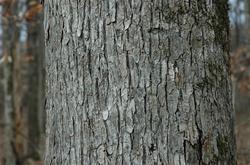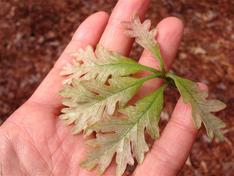 Photo by Laura Cotterman Photo by Laura Cotterman The South’s forests encompass a broad range of ecosystems and landscapes and are home to many rare, threatened, and endemic species of plants and animals. Forest ownership and uses in the South have been changing dramatically in the early 21st century, raising questions about the future of our southern forests. A huge transition in forestland ownership has been occurring, with the forest products industry divesting about three-fourths of its timberland holdings in the southern U.S. in the ten years between 1998 and 2008. What are the implications for forest management and sustainability? How will forest land ownership in the South continue to change in the future? Private landowners hold 86 percent of the forested land in the southern U.S., with two-thirds of this area owned by families or individuals. The average size of family-owned forest holdings is small: only 29 acres (although 60% of family-owned forests exceed 100 acres in size). Two-thirds of these private landowners harvest and sell trees from their land. In recent history, much of the South’s forests were owned by big timber production industries. . . .
1 Comment
 All evidence now confirms that we humans have dramatically, and likely irreversibly, altered the Earth’s climate, and that the negative consequences are widespread, dramatic, and fearsome. There is little cause for optimism that our national or international leaders are willing to take the necessary actions to control and curtail the activities that continue to generate the fossil fuel emissions largely responsible for altering the world’s climate. Our natural ecosystems and human health and welfare are all at risk. We do not know what all the consequences will be or what will befall us, as carbon emissions into the Earth’s atmosphere and oceans exceed all bounds of sustaining our climate and life-support systems, and continue to accumulate beyond the capacities of the atmosphere and oceans to withstand profound alteration. Over the past three centuries we humans have indulged in profligate extraction and emissions that are about to put the Earth’s natural systems “over the edge.” Scientists now report that each month is the warmest on record and in known time, exceeding only the worldwide temperatures of the previous year. And atmospheric temperatures are climbing, while likewise the temperatures and surface levels of the oceans are rising ever higher. We are in deep trouble. Our societies and political leaders seem locked into practicing violence on the Earth, without regard for the future—that is, the long term well-being or even survival of people, society, ecology, or ecosystems. Carelessness is at the core of the prevailing economics that have brought us this plight. Our economic model assumes endless growth and this, in turn, relies on “extractivism”—a term used to describe economies based on the removal of ever more raw materials from the earth, usually for export to more affluent countries and the traditional colonial powers, where so-called “value” is added. Extractivism allows unlimited taking of the earth’s natural resources, by strip mining, mountaintop removal, old-growth forest clearcutting, subsurface fracking, and more. Extractivism assumes and establishes “sacrifice zones” in places populated by human and natural communities that “don’t count” by the values of the engineers of “progress.” The sacrificed places, and their inhabitants, can be poisoned, ravaged, drained, or otherwise destroyed for the supposed greater good of economic progress—or at least for the wealth of the exploiters. Those “sacrifice zones” of extensive resource extraction and exploitation (or areas downstream or downwind of them) are the lands of lost people and lost natural ecology. But we now know that this resource-depleting economic model is inherently flawed and unsustainable . . . and is about to bring us disaster. Nature is fragile and resilient but has its limits. We are now passing those limits. We are all in the same sinking boat, though poor people and people of color are closest to the hole. There is a growing literature about our world’s changed climate, the causes and response strategies. But I do recommend for your reading Naomi Klein’s 2014 book, This Changes Everything: Capitalism vs The Climate (Simon & Schuster). --Chuck Roe, President SCP |
When we see land as a community to which we belong, we may begin to use it with love and respect.... Conservation, viewed in its entirety, is the slow and laborious unfolding of a new relationship between people and land." There is in fact no distinction between the fate of the land and the fate of the people. When one is abused, the other suffers. From the PresidentSCP President Chuck Roe looked at land conservation along the route of John Muir's "Southern Trek." About ViewpointThis blog offers views of our Board and partners. We invite your viewpoint on the following questions: Archives
April 2024
Categories
All
|

 RSS Feed
RSS Feed